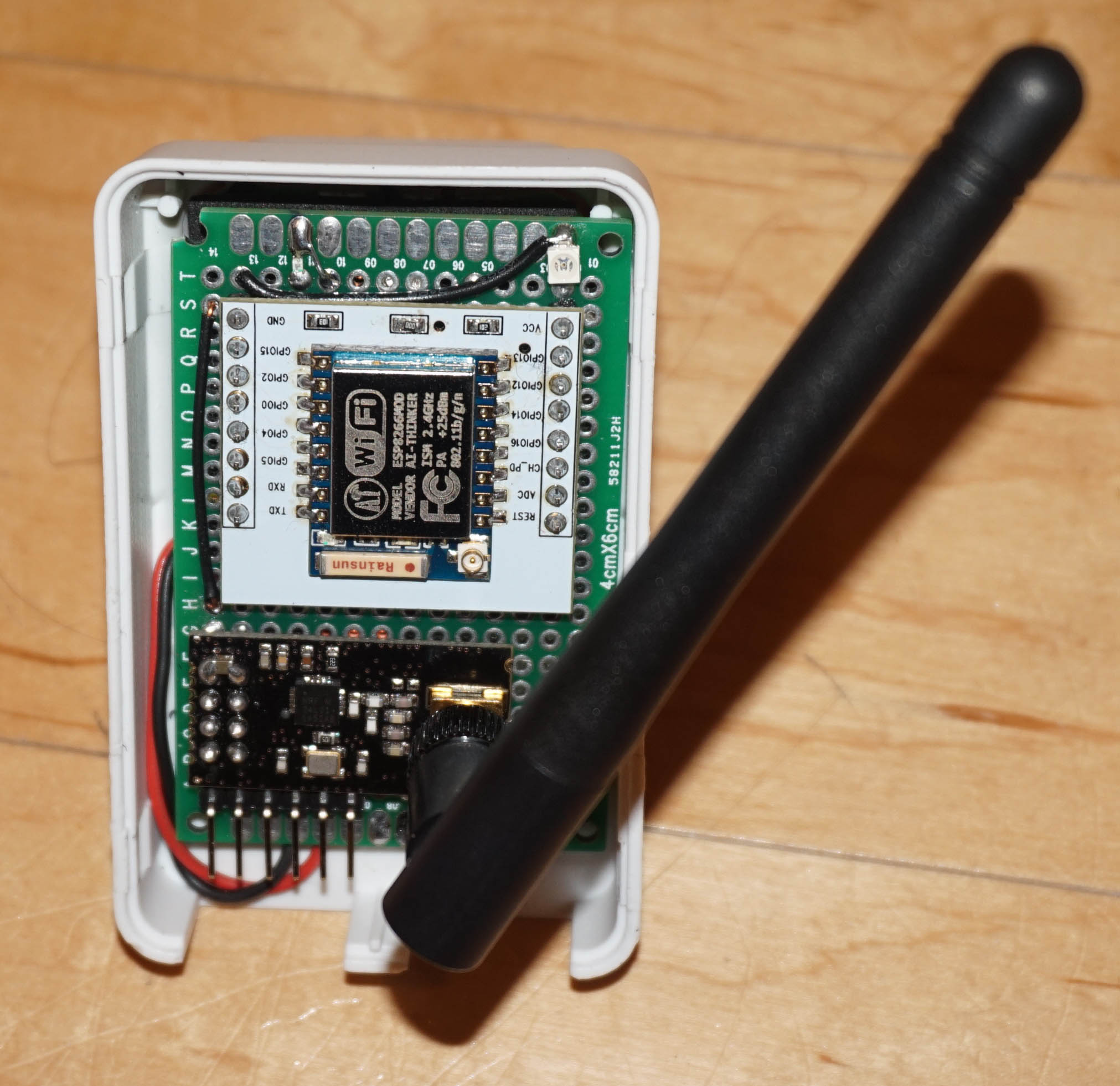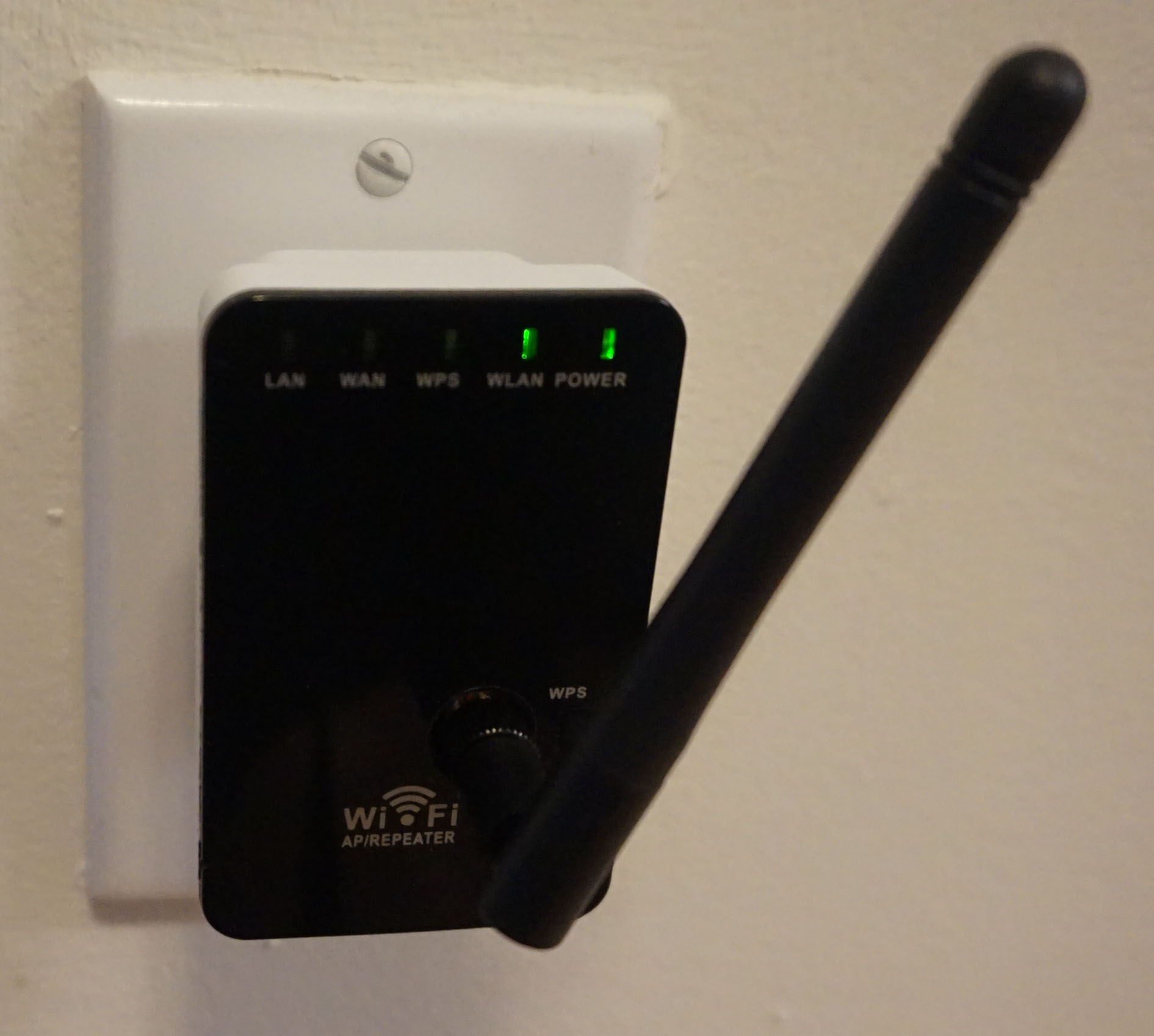ESP8266 WiFi gateway port for MySensors
-
here is my ESP8266 wifi gateway installed in wifi repeater box, taking the advantage that its has a 5 volts power supply.


-
I'd been using the ESP gateway for several weeks, but recently was having trouble adding a new sensor I am developing.
Since the copy of dev I built it with was now out of date, I went ahead and updated... still wasn't working right so while I had the serial link to it I checked and noticed it was crashing and cycling. It would work for hours, until I fired up my new node, then crash about immediately. A few dozen debug(PSTR())'s later, I found a cause.
In core/MySensorsCore.cpp the result of _msg.getConfig() is dereferenced in a comparison, and it's possible it could return NULL ( like when it's a new node ). I put a check around that and it's not crashing anymore. Which is more than what I can say for my new sensor node....
I have not tested this change with an AVR.
I submitted PR 264.
-
on some basic debugging, seems like my sketch is crashing in setupGateway.
infact even adding a print statement, it only prints first 3 chars.
My question is setupGateway takes output as an arg, which in turn is a function, should there be some parameters for this function?
also "Serial.print(serialBuffer);" does not print anything i added prints above and before and they don't show up either.va_end (args); Serial.print("A1"); Serial.print(serialBuffer); Serial.print("A2");any suggestions?
-
on some basic debugging, seems like my sketch is crashing in setupGateway.
infact even adding a print statement, it only prints first 3 chars.
My question is setupGateway takes output as an arg, which in turn is a function, should there be some parameters for this function?
also "Serial.print(serialBuffer);" does not print anything i added prints above and before and they don't show up either.va_end (args); Serial.print("A1"); Serial.print(serialBuffer); Serial.print("A2");any suggestions?
-
@D_dude flush the serial output after each print.
The ESP will output the serial data in the background while your programm continues and then it crashes.Hi,
I'm getting all the time this:ESP8266 MySensors Gateway
Connecting to layla
......Connected!
IP: 192.168.0.102
0;0;3;0;9;gateway started, id=0, parent=0, distance=0Then it got stuck so I do reset and getting this in loop:
ESP8266 MySensors Gateway
Connecting to layla
..Connected!
IP: 192.168.0.102
0;0;3;0;9;radio init failSoft WDT reset
ctx: cont
sp: 3ffefe70 end: 3fff00a0 offset: 01b0stack>>>
3fff0020: 00000000 00000000 3ffeed74 40203665
3fff0030: 0000007f 3ffef074 40205ba0 3ffef080
3fff0040: 40202114 00000001 00000000 40205c10
3fff0050: 6600a8c0 00ffffff 0100a8c0 3ffef074
3fff0060: 3ffe84ac 3ffeee8c 3ffeefb0 4020256b
3fff0070: 3ffe86b8 6600a8c0 00000000 00000000
3fff0080: 3fffdc20 00000000 3ffef06d 40205bde
3fff0090: 00000000 00000000 3ffef080 40100114
<<<stack<<<ets Jan 8 2013,rst cause:2, boot mode:(3,6)
load 0x4010f000, len 1264, room 16
tail 0
chksum 0x42
csum 0x42
~ld -
Hi,
I'm getting all the time this:ESP8266 MySensors Gateway
Connecting to layla
......Connected!
IP: 192.168.0.102
0;0;3;0;9;gateway started, id=0, parent=0, distance=0Then it got stuck so I do reset and getting this in loop:
ESP8266 MySensors Gateway
Connecting to layla
..Connected!
IP: 192.168.0.102
0;0;3;0;9;radio init failSoft WDT reset
ctx: cont
sp: 3ffefe70 end: 3fff00a0 offset: 01b0stack>>>
3fff0020: 00000000 00000000 3ffeed74 40203665
3fff0030: 0000007f 3ffef074 40205ba0 3ffef080
3fff0040: 40202114 00000001 00000000 40205c10
3fff0050: 6600a8c0 00ffffff 0100a8c0 3ffef074
3fff0060: 3ffe84ac 3ffeee8c 3ffeefb0 4020256b
3fff0070: 3ffe86b8 6600a8c0 00000000 00000000
3fff0080: 3fffdc20 00000000 3ffef06d 40205bde
3fff0090: 00000000 00000000 3ffef080 40100114
<<<stack<<<ets Jan 8 2013,rst cause:2, boot mode:(3,6)
load 0x4010f000, len 1264, room 16
tail 0
chksum 0x42
csum 0x42
~ld -
i have been using wifi gateway with Domoticz controller without any problems until recentely. After the last update to beta version of the controller, the gateway crashes when the controller request gateway version:
Gateway startup complete.
Client 0: 0;0;3;0;2;Exception (28):
epc1=0x4000bf80 epc2=0x00000000 epc3=0x00000000 excvaddr=0x00000000 depc=0x00000000ctx: cont
sp: 3ffebf60 end: 3ffec1f0 offset: 01a0I have tested with telnet client with the same request and it was ok. Then I saw that the request from controller was terminated with only <LF> and not with <CR><LF> and this is why it crashed. I have added the following to the sketch:
-
if (inChar == '\n') { if (inputString[i].string[inputString[i].idx-1] != '\r') { // if the last char is not CR then add it inputString[i].string[inputString[i].idx++]='\r'; } // a command was issued by the client // we will now try to send it to the actuator
and now it seems to work.
Is this the right way to go?
Thanks -
-
Are you talking abut this line of code?
https://github.com/mysensors/Arduino/blob/development/libraries/MySensors/core/MyGatewayTransportEthernet.cpp#L194 -
-
Hi all,
First, I have to say this is awsome what @Yveaux did, thank you!Sorry if this question takes you back in time. I don't know what channel and id to use for the nodes,I tried channel 97 and id from 1-5 but it is not working..
are you using mesh lib?@Yht said:
I don't know what channel and id to use for the nodes
Just leave the default channel untouched for both sensors and gateway. It should be fine.
The gateway will automatically be assigned ID 0, the nodes can have any fixed ID.
Dynamic ID assignment requires some extra software, as the gateway does not support it. -
I'm also seeing my ESP8266 gateway crash when the controller requests its version.
I had not seen this thread so I started a new topic here: http://forum.mysensors.org/topic/2493/esp8266-wifi-gateway-crashes-and-reboots-when-controller-connects
-
hi,
maybe you have already seen it...but you can get cheap and smaller nodemcu. crazy price! I have ordered some, and waiting for them...
http://fr.aliexpress.com/item/D1-mini-Mini-NodeMcu-4M-bytes-Lua-WIFI-Internet-of-Things-development-board-based-ESP8266/32529101036.html?spm=2114.06010108.3.1.04LsjX&ws_ab_test=searchweb201556_2_79_78_77_80,searchweb201644_0,searchweb201560_9 -
hi,
maybe you have already seen it...but you can get cheap and smaller nodemcu. crazy price! I have ordered some, and waiting for them...
http://fr.aliexpress.com/item/D1-mini-Mini-NodeMcu-4M-bytes-Lua-WIFI-Internet-of-Things-development-board-based-ESP8266/32529101036.html?spm=2114.06010108.3.1.04LsjX&ws_ab_test=searchweb201556_2_79_78_77_80,searchweb201644_0,searchweb201560_9 -
Just wanted to chime in and say thank you for this gateway script @Yveaux
I originally had an ethernet gateway for the longest time. But when I changed over to an OnHub router, it stopped working because it doesn't like to handle static IP, and the current branch sketch is too large to enable DHCP. This worked wonderfully with the OnHub out of the box (ver 7390.62.2) and shows up with a hostname of ESP_DA7D8B.
Thanks again!
-
Hi,
When testing the ESP8266MQTTClient (downloaded latest version of the library today) and compiled with the NodeMCU 1.0 ...... option I get an odd result. The message at startup is (please disregard the "Radio init fail" - the radio was not yet connected. I just wanted to check the WiFi ):2dO,4`lLMØl 8ðÿ0;0;3;0;9;Starting gateway (RNNGE-, 1.6.0-beta)
0;0;3;0;9;Radio init failed. Check wiring.
scandone
state: 0 -> 2 (b0)
state: 2 -> 3 (0)
state: 3 -> 5 (10)
add 0
aid 2
pm open phy_2,type:2 0 0
cntconnected with XXXyyy, channel 1
dhcp client start...
ip:192.168.1.167,mask:255.255.255.0,gw:192.168.1.1I can see from the router that the connection to 192.168.1.167 is successful but the oddity is that I have set the gateway to use a static address and also connect to a SSID which is not XXXyyy. The defines are:
// Enable MY_IP_ADDRESS here if you want a static ip address (no DHCP)
#define MY_IP_ADDRESS 192,168,1,22
// If using static ip you need to define Gateway and Subnet address as well
#define MY_IP_GATEWAY_ADDRESS 192,168,1,1
#define MY_IP_SUBNET_ADDRESS 255,255,255,0So the ESP8266 uses dhcp when it should have a static address and connects to a SSID which is not given but may have been previously used at earlier tests.
I have looked at the code and tried a few changes to defines but none resulted in the override of dhcp.
Anyone have a clue? -
I have the exact hardware in this setup but can't even get to the point where the hardware is a problem! I'm having compile errors during verify that make no sense and that I can't seem to find in the forums using search:
In file included from Esp8266Gateway.ino:69:0:
C:\Users\xxxxx\Documents\Arduino\libraries\SPI/SPI.h:982:8: error: 'SPIClass' does not name a type
extern SPIClass SPI;Any suggestions? I'm running windows 10 and Arduino 1.6.5 with the most current esp8266 board files through board manager.
Apparently me and anything arduino related are like oil and water, yet I keep buying the stuff.
